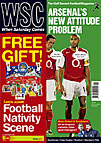 Arsenal’s move for Emmanuel Eboué of Beveren is just the latest example of a strange import-export trade in African footballers, as John Chapman explains
Arsenal’s move for Emmanuel Eboué of Beveren is just the latest example of a strange import-export trade in African footballers, as John Chapman explains
The thermometer is stuck on 4°C. There’s a cold wind blowing around Antwerp’s Bosuil stadium. Around 6,000 fans have braved the elements to see the locals, languishing in Belgium’s second division, take on mighty Beveren, who qualified for this season’s UEFA Cup through being runners-up in the 2004 Belgian Cup. In theory, it’s a Flemish derby. In practice, it’s a visible sign of globalisation’s impact on football.
There are 16 Africans in the starting line-ups. Ten of them, from Ivory Coast, are playing for the visitors. In one corner of the ground, 200 Beveren fans are doing their best to outsing their Antwerp counterparts. The fans are bedecked in Beveren’s yellow and blue, but there’s not a black face amongst them. This region may be the centre of the Vlams Blok, Belgium’s equivalent to the British National Party, but the Flemish fans seem happy to be following a team composed almost entirely of African players.
The process started in 1995 when former France international Jean-Marc Guillou developed a youth academy, working closely with Ivory Coast club ASEC Abidjan. The team, including a teenage Kolo Touré, won the 1999 African Super Cup and Guillou realised he was sitting on a gold mine. In 2001, he discovered Beveren – a sleepy town a few kilometres from Antwerp – with a football club on the verge of bankruptcy. Guillou invested close to £1 million in the club on condition that he could bring in a steady flow of players (four per season) from his academy. It all turned sour when Guillou got a little greedy and wanted to take more players. ASEC Abidjan didn’t agree, as they could see little benefit from the deal. After an acrimonious split, Guillou, unperturbed, took the best players and set up a new academy elsewhere.
Any profits from transfers out of Beveren are shared between Guillou and an investment syndicate called Goal, thought to include friends of Guillou. Beveren receive a maximum of 30 per cent – probably much less – of the fees. For the investors, business is booming – so far £6m has been generated in transfer fees. In the latest deal, central defender Emmanuel Eboué signed for Arsenal for a reported £1.5m. Before that, transfers included Kolo Touré’s brother Yaya (£1.5m to Metalurg Donetsk in Ukraine) and Gilles Yapi Yapo to Nantes for £1m.
But Beveren is the tip of a very slow-moving iceberg. Back in 1998, Manchester United struck a deal with Royal Antwerp to take advantage of Belgium’s naturalisation laws, whereby players could be brought in from Africa, South America and elsewhere, and be classed as European Union citizens after two years. So far there has been no payback. The nearest United have come to a success is buying Fangzhou Dong from Chinese club Dalian Shide FC for a large fee, based on first-team appearances, and loaning him out to Antwerp.
Others have jumped on the crawling bandwagon. Chelsea have an arrangement with Westerlo, a tiny Flemish club who now have Joe Keenan – the forgotten man of English football – and a number of South Africans. Blackburn Rovers have an almost secret deal with Cercle Brugge. Two players have found their way from Ewood Park to the Venice of the North, but so far their success is minimal, with just 24 minutes of playing time. Finally, it has been reported in the Belgian press that FC Brussels’ highly respected coach Emilio Ferrera was recently at Anfield for talks about collaboration. The only real success has been at Arsenal. And that has been down to contacts – just as in any other business. Arsène Wenger and Guillou go back a long way. ( If Sir Alex was dependent on his old chums, he’d be looking to bring players out of Paisley.)
As for Beveren, the fans are happy with the influx of talent. Although very few Arsenal players have been sent to Belgium, the deal had a big impact when Irish goalkeeper Graham Stack stopped a pitch invasion by knocking out a Royal Antwerp fan. The majority of the Ivory Coast imports are happy with their lot. Although not well paid by UK standards, by African norms they are wealthy superstars. They, of course, are the lucky ones: thousands have been tested at the Guillou academies and only a few accepted.
The investors are delighted – 30 per cent of £6m is not a bad payback over three years. Jean-Marc himself is a rich man and is planning his retirement. His daughter is “in the business”and will be looking to continue the import-export flow. So Belgium looks set to remain the gateway to the north for a privileged few and to the benefit of even fewer Europeans.
Back to the Bosuil stadium, once an international venue but now crumbling. The match has finished with Beveren defeating Antwerp 1-0. A few “supporters” are handing out literature as the crowd disperses. A glance shows that it’s from the Vlams Blok – a sign that not all is peaceful.
From WSC 215 January 2005. What was happening this month